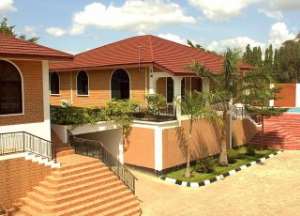
Accra, June 20, GNA - Ghana has joined the Shelter-Afrique, a Pan-African Financial Institution, to enable real estate developers have access funds at moderate interest rates, to assist in providing more housing units for Ghanaians.
Ghana was admitted as the 43rd member of Shelter –Afrique, a company, headquartered in Nairobi Kenya in 2011.
Nii Nortey Duah, Deputy Minister of Water Resources, Works and Housing in an address read on behalf of the Sector Minister, Mr Enoch Teye Mensah, on Wednesday announced these at the launch of Ghana's Housing Profile in Accra on Wednesday.
He said Ghana's decision to join Shelter-Afrique emerged from a two pronged approach to mobilising funds both domestically and internationally, to support the housing sector.
Nii Duah said the Ministry was currently implementing a policy to increase the usage of local building materials like bricks and pozzalana cement in executing public building projects from 20 per cent to 60 per cent by 2020.
He said: “Land banks have been created. Some of the land will be used for social or affordable housing by government alone, or government in partnership with the private sector. The rest will be made available to private investors, who face challenges obtaining land with good title”.
Nii Duah said the profile took a comprehensive look at Ghana's urban housing sector, provided a realistic way forward that would impose a reality check in the housing sector and serve as a road map for the development of the sector.
Dr Graham Tipple, a Consultant with United Nations Human Settlements Programme ( UN-Habitant), is the principal author of the 212-paged profile.
It gives in-depth understanding of the structure and functioning of the housing sector, the role housing policies play in influencing housing markets and the provision of affordable housing options.
The document identified the main constraints militating against the efficient delivery of housing as access to land with good title, access to housing finance at affordable rates, availability of local building materials in adequate quantities and provision of infrastructure.
It indicated that about 90 per cent of all housing was provided by the informal sector while the formal sector accounted for the rest.
Nii Duah said the challenges that were identified in the profile were being addressed holistically in the draft National Housing Policy, which would include other findings and sent to Cabinet soon.
He said the draft policy had an overall goal of providing adequate, safe, decent and affordable housing that was accessible and sustainable with infrastructural facilities using private sector as the driving force, with Government as a facilitator.
Dr Tipple said the profile was based on interviews with major stakeholders and data with a sample of 332 urban households in Accra, Kumasi, Sekondi-Tarkoradi and Tamale.
He said that the profile revealed a few squatters in Ghana, which was unusual in Africa.
Dr Tipple said about 5.7 million rooms or two million urban dwelling places together with all the accompanying land and infrastructure for adequate housing were needed between 2010 and 2020.
He said that building houses was not too expensive in Ghana, but because wages of people were too low they had difficulty in owning houses.
Mrs Ruby Sandhu-Rojon, UN Resident Coordinator, said the recent Population and Housing Census report, indicated that Ghana had crossed the urban divide, and was rapidly urbanising with Greater Accra and Ashanti Regions having largest population.
She called for the creation of conditions that would favour the scaling up of housing supply both in quantity and diverse sizes, type and location.
Mrs Sandhu-Rojon explained that this would ensure rapid supply of low-income housing for the urban poor and “This will avoid the increase in horizontal growth in our cities.”
She said the profile would also help address the more than one million housing deficit challenge of Ghana, reduce poverty and meet the Millennium Development Goals.
Mr Doudou Mbaye, Representative of UN-Habitat, said the document should be used to aid the formulation of Ghana's housing policy, to address the inadequacies of the housing sector and not “be left to gather dust”.
GNA




 Meta releases new version of conversational AI across its platforms
Meta releases new version of conversational AI across its platforms
 Cape Town named Africa’s Best Airport 2024 by Skytrax
Cape Town named Africa’s Best Airport 2024 by Skytrax
 Bono East: Four injured after hearse transporting corpse crashes into a truck
Bono East: Four injured after hearse transporting corpse crashes into a truck
 ‘Be courageous, find your voice to defend our democracy’ — Sam Jonah urges journ...
‘Be courageous, find your voice to defend our democracy’ — Sam Jonah urges journ...
 Exodus of doctors, nurses and teachers have worsened because of unserious Akufo-...
Exodus of doctors, nurses and teachers have worsened because of unserious Akufo-...
 2024 election: Avoid insults, cutting down people in search of power – National ...
2024 election: Avoid insults, cutting down people in search of power – National ...
 ‘You passed through the back door but congratulations’ — Atubiga on Prof Jane Na...
‘You passed through the back door but congratulations’ — Atubiga on Prof Jane Na...
 Government’s $21.1 billion added to the stock of public debt has been spent judi...
Government’s $21.1 billion added to the stock of public debt has been spent judi...
 Akufo-Addo will soon relocate Mahama’s Ridge Hospital to Kumasi for recommission...
Akufo-Addo will soon relocate Mahama’s Ridge Hospital to Kumasi for recommission...
 We must not compromise on our defence of national interest; this is the time to ...
We must not compromise on our defence of national interest; this is the time to ...
